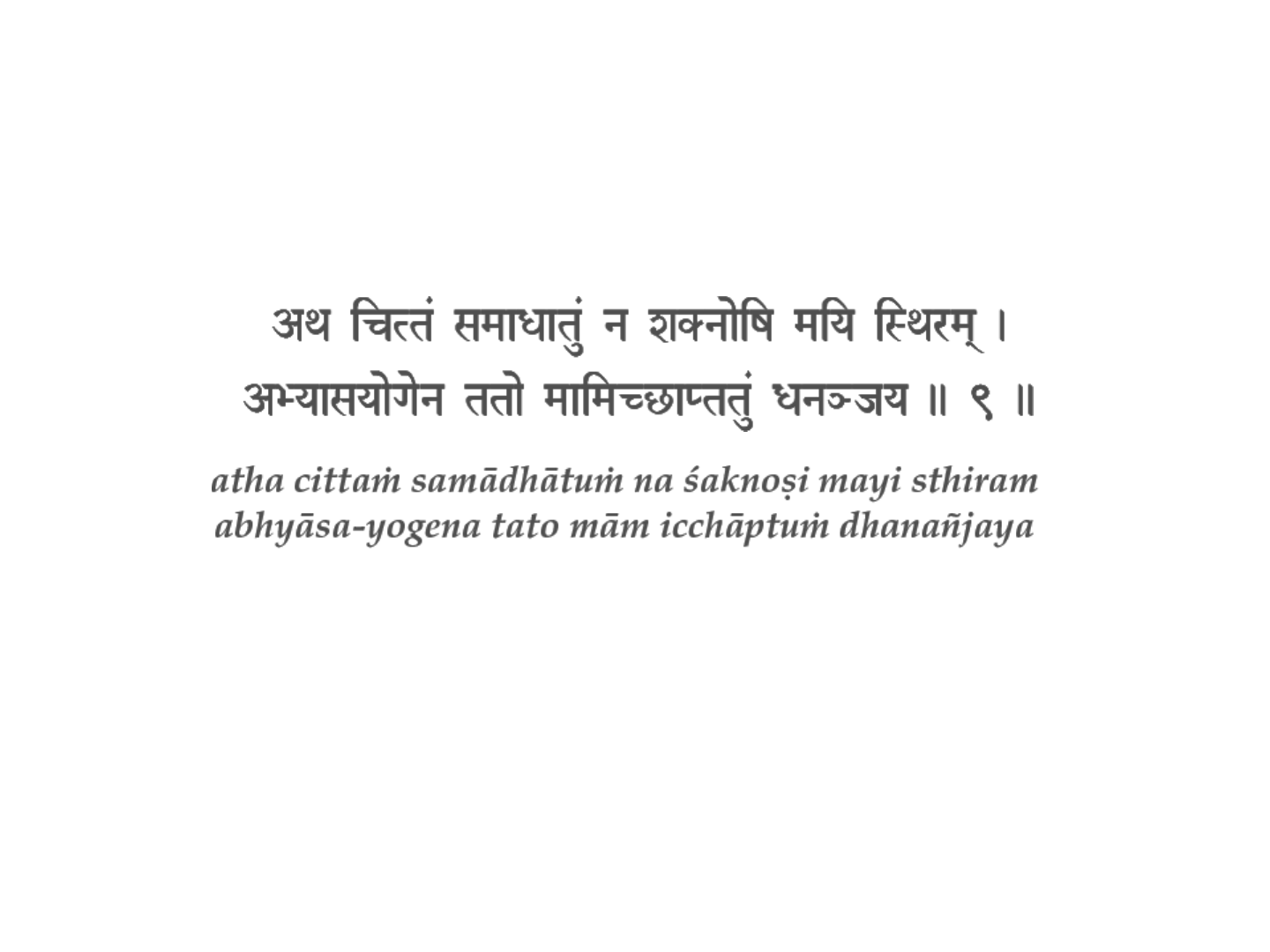
Bhagvad Gita: Chapter 12
The Path to Devotion
Sanatan Mandir School
Class 6

Shrimad Bhagavad-Gita
Bhakti Yoga (Yoga of Devotion)
The Sanskrit word bhakti comes from the root bhaj, which means “to adore or worship God.”
Bhakti yoga has been called “love for love’s sake” and “union through love and devotion.”
Bhakti yoga, like any other form of yoga, is a path to self-realization, to having an experience
of oneness with everything.
Bhakti yoga is the path of devotion, the method of attaining God through love and the loving
recollection of God. The goal of the bhakta, the devotee of God, is to attain God-realization—
oneness with the Divine. The bhakta attains this through the force of love, that most
powerful and irresistible of emotions.
Love is accessible to everyone: we all love someone or something, frequently with great
intensity. Love makes us forget ourselves, our whole attention being devoted to the object of
our adoration. The ego loosens its grip as we think of our beloved’s welfare more than our
own. Love gives us concentration: even against our will, we constantly remember the object
of our love. In an easy and totally painless way, love creates the preconditions necessary for a
fruitful spiritual life.
Vedanta therefore says, Don’t squander the power of love. Use this powerful force for God-
realization. We must remember that when we love another we are really responding—
though unconsciously—to the divinity within him or her. Our love for others becomes
unselfish and motiveless when we are able to encounter divinity in them.
The point to remember is that God is our own, the nearest of the nearest and dearest of the
dearest. The more our minds are absorbed in thoughts of Him—or Her as the case may be—
the closer we shall be to attaining the goal of human life, God-realization.

vasudeva sutaṁ devaṁ kaṁsa cāṇūramardanam |
devakī paramānandaṁ kṛṣṇaṁ vande jagadgurum ||
vasudeva sutaṁ -- son of Vasudeva; devaṁ -- the divine; kaṁsa cāṇūramardanam -- killer of
kaṁsa and cāṇūra; devakī paramānandaṁ -- one who gives great joy to Devakī; kṛṣṇaṁ -- to
Kṛṣṇa; vande – praise, salutations; jagadgurum -- to the guru of the universe;
I offer my obeisance’s to Lord Kṛṣṇa, the beloved son of Vasudeva, who killed the great
demons Kaṁsa and Cāṇūra, who is the source of great joy to Mother Devakī; and who is
indeed a world teacher and spiritual master of the universe.

Dear Lord, Who is better versed in Yoga - the ones who worship You in
constant devotion with your form or the ones who worship You as the
formless?

Sri Bhagavan said: Those who fix their minds on me and worship me
(with form) ever with supreme faith, I consider them as perfect in
Yoga.(Yoga meaning-- Union with God)

But those who worship me as the formless, as the unchanging, the
imperishable and the Omnipresent ONE...

Those who have restrained their senses, who are even minded
everywhere, who are engaged in the welfare of all the beings, verily,
they also come to Me.

But for human beings, it is more difficult to realize the formless God
than the One with form. Greater is their trouble whose minds are set
on the Unmanifested; for the goal—the Unmanifested—is very difficult
for the embodied to reach.

But those who worship me, renouncing all actions in Me, regarding Me
as the Supreme Goal, meditating on Me with single minded devotion...

For them whose thought is so set on Me, O Partha (another name for
Arjuna), I will become very soon, the One to deliver them from this cycle
of birth and death.

Fix your mind on Me alone, Let your thoughts dwell in Me. (By doing so)
You will live in Me here after. Of this, there is no doubt.

But if you are not able to fix your mind steadily on Me, O Dhananajaya
(another name for Arjuna), then seek to reach Me by Abhyaasa Yoga
(through constant practice).

If you are unable to do constant practice, be intent on doing all actions
for my sake; even by performing actions for my sake, you will attain
perfection.

If you are unable to do even this, surrender thyself to me in love, not
worrying about the fruits of actions with the self subdued.

Better indeed is knowledge than formal practice; better than knowledge
is meditation; better than meditation is the renunciation of the fruit of
the action (surrender in love); peace immediately follows this.

He who hates no being, who is friendly and compassionate to all, who is
free from the feeling of I and mine, even-minded in pain and pleasure
and forbearing...

Ever content, steady in meditation, self controlled and possessed of firm
conviction, with mind and intellect fixed on me, such a devotee is dear
to me.

He by whom the world is not afflicted and whom the world cannot
afflict, he who is free from joy, anger, fear and anxiety - he is dear to me.

He who has no wants, who is pure and prompt, unconcerned,
untroubled, and who is selfless in all his undertakings, he who is thus
devoted to Me, is dear to Me.

He who neither rejoices nor hates nor grieves nor desires, renouncing
good and evil (treating both as the same), full of devotion, he is dear to
Me.

He who is the same to foe and friend and also in honor and dishonor,
who is the same in cold and heat, in pleasure and pain, who is free from
attachment...

To whom blame and praise are equal, who is silent, content with
anything, free of selfish attachment, steady-minded and full of
devotion-such a one is dear to Me.

Those, who follow this immortal dharma described above with
devotion and faith, looking upon Me as the Supreme Goal, they are
exceedingly dear to Me.

Om tatsditi Srimad Bhagavad Geetaasu Upanishadsu
Brahma Vidyaayaam Yoga Shastrey
Sri Krishaarjuna Samvaadey Bhakti Yogo Naama
Dvaadshodhyaayaha || 12||
Hari Om Tat Sat!
